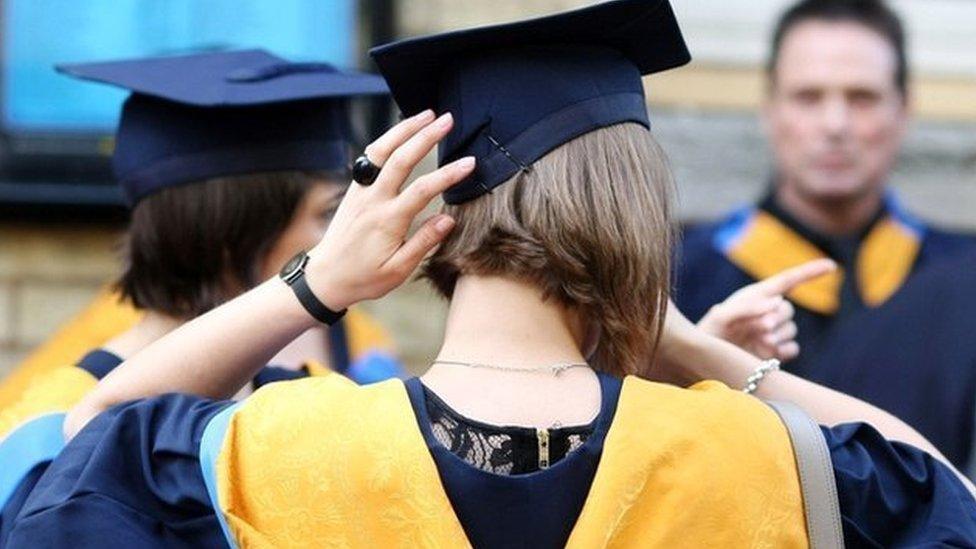Scrap interest on student loans, say vice-chancellors
- Published
- comments

The government has announced a £50m package to support students
The interest on student loans in England should be scrapped for 15 months, a group of universities says.
The vice-chancellors of seven universities say this would cover the period from the first national lockdown until summer 2021.
They say waiving the charge would ease the pressure on graduates.
But the government said such a move would not help students in need amid the coronavirus pandemic as it announced a boost to hardship funding.
Universities minister Michelle Donelan said the vice-chancellors' proposal wouldn't put cash into students' pockets to support them during the pandemic.
She told BBC Breakfast that "at least half of students don't actually pay back their student loan", adding that the government's priority was helping "those students most in need".
The government has announced an extra £50m for student hardship funds in England, on top of £20m agreed in December.
In a letter to Prime Minister Boris Johnson, Chancellor Rishi Sunak and Education Secretary Gavin Williamson, the vice-chancellors say students are paying a heavy price in the Covid-19 pandemic.
"The opportunity and wealth gap between the young and old is already unacceptably large - and existing challenges are being amplified by the impact of the pandemic on students and their life chances," the letter says.
It says the pandemic has placed "unprecedented pressures on our students", with demands for hardship funds increasing by over 100% in some universities.
The letter is signed by seven vice-chancellors:
Prof Anthony Forster from the University of Essex
Prof Frances Corner from Goldsmiths, University of London
Prof Karen Cox from the University of Kent
Prof Paul Layzell from Royal Holloway, University of London
Prof David Richardson from the University of East Anglia
Prof Adam Tickell from the University of Sussex
Prof Robert Van de Noort from the University of Reading
They call for a reduction equivalent to waiving the interest rate on student loans for the 15 months from the first national lockdown in March 2020 to the end of this academic year.
In England students are currently charged 5.6% on their student loans while they are studying, based on the retail price index, plus 3% - this applies until the 5 April after they graduate and then varies depending on earnings.
Support fund
The letter comes as the government says students facing financial pressures due to the pandemic will have access to an additional £50m support fund.
Ms Donelan said: "We know that the pandemic, and the implications of the pandemic, has put extra pressure on students' finances."
Universities will be able to use the extra funding to help students facing loss of employment, additional costs for alternative accommodation or to support access to remote teaching amid Covid-19.
The majority of university students in England have been told not to return to campus under the latest lockdown, sparking calls for rent rebates for term-time accommodation, and for tuition fee refunds.
In December, the government announced a one-off fund of up to £20m to help students most in need of support in exceptional circumstances - this further £50m takes the total to £70m for this financial year.
The funding will be distributed by the Office for Students (OfS) directly to universities, which will prioritise the students most in need.

Many students have been calling for rent and tuition fee rebates
Last week, a survey from the Office for National Statistics suggested that a growing proportion of university students were not happy with their academic experience - and nearly two in three had seen their mental health worsen.
The University and College Union general secretary, Jo Grady, described the funding as a "sticking plaster".
"The government needs to go further and provide proper funding to avoid irreparable long-term damage to the sector's reputation," she said.
Alistair Jarvis, chief executive of Universities UK, said the additional funding was a "positive step", but added: "As the serious mental health impact of the pandemic continues to be felt, universities need further funding to alleviate the substantial increases in demand that university wellbeing and support services are experiencing."
Nicola Dandridge, chief executive of the OfS, said the funding was welcome.
"We intend to distribute it as swiftly as possible to benefit those who are most in need," she said.
How much might the package cost the government?
The independent consultancy London Economics (LE) looked just at first year undergraduates, from England, studying across the UK.
The cost of writing off their interest, for that one cohort, for this academic year is estimated at roughly £33m, or a 0.3% increase in the cost to the government of funding this cohort.
Maike Halterbeck, associate director at LE and a specialist in higher education fees and funding, said not much would be gained for students.
"In spite of its apparent attractiveness, this proposal wouldn't provide any benefit to the average graduate.
"Only the highest earning - predominantly male - graduates would derive a small benefit of a few hundred pounds. It would not affect female graduates, or lower earning male graduates"

LOCKDOWN LEARNING: Lesson support available on BBC Bitesize for every child, of every age, every day of the week
BITESIZE DAILY ON BBC IPLAYER: Help is at hand for your homeschooling needs
